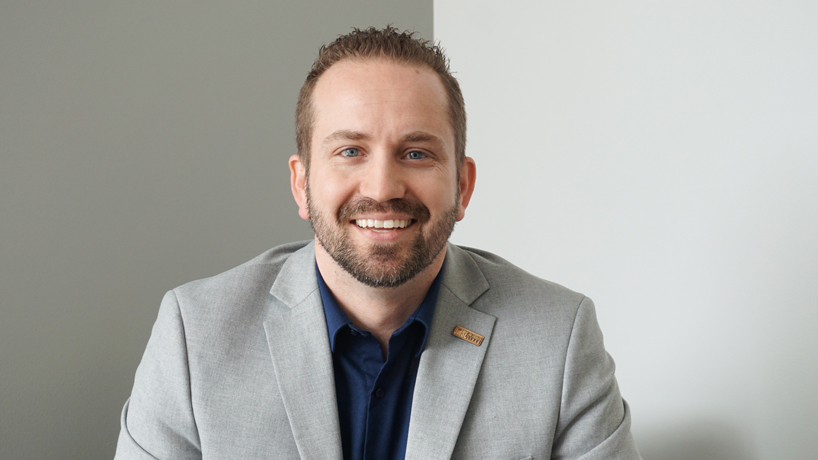
UMSL College of Education Assistant Professor James Shuls was a guest on Friday’s episode of “St. Louis on the Air,” discussing the challenges facing teachers in St. Louis Public Schools and other districts like it. (Photo courtesy of Evie Hemphill/St. Louis Public Radio)
The union that represents Saint Louis Public Schools teachers, American Federation of Teachers Local 420, recently initiated arbitration proceedings against the district. The union is seeking more than $10 million in salary increases and back pay for nearly 1,000 employees who it feels are being underpaid given the pay other teachers with similar credentials in the district are receiving, according to reporting by St. Louis Public Radio | 90.7 KWMU.
To University of Missouri–St. Louis Assistant Professor James Shuls, though, the issues start with the single-schedule salary structure that the SLPS uses. During a Friday appearance on the St. Louis Public Radio show “St. Louis on the Air,” Shuls said districts such as SLPS don’t have the flexibility to pay teachers more. Single-schedule structures aim to normalize pay for teachers by starting them all off around the same salary range and providing for steps up in pay due to factors such as experience or advanced degrees.
“I view that salary schedule as what you’re minimally obligated to pay,” Shuls said. “In St. Louis’ perspective, they have some positions in which they’re wanting to pay people more. I view that as a good thing, to be able to pay teachers more than what you were initially supposed to be earning. It’s a bad policy up front to try to lump everyone into the same boat and pay everyone the exact same amount. We talk all the time about teacher retention being a problem. The salary is one of the best levers you have to attract and retain people. If we don’t have any flexibility on the district’s part, we’re undermining the district.”
Shuls spoke on “St. Louis on the Air” with host Don Marsh, SLPS Superintendent Kelvin Adams and Missouri National Education Association Legislative Director Otto Fajen, who pushed back on Shuls’ view. Fajen felt established salary schedules and equitable teacher pay help keep people in the profession.
Shuls said that more variation in starting salaries would help districts such as SLPS attract talent to much-needed specialties.
“There is a problem with turnover, and it’s especially high in urban districts,” Shuls said. “Throughout the state, we struggle with attracting math teachers, science, special education, all these subject areas, and this goes to the single salary schedule. Being able to leverage pay to attract people is incredibly important.”
As the graduate program director of educational leadership and policy studies at the UMSL College of Education, Shuls has been a sought-after expert in the first few months of 2019. He was a panelist at the International School Choice and Reform Conference in Lisbon, Portugal, in January. He also participated in a Teach for America St. Louis “Politics and Pints” discussion Feb. 22 along with state Senator Jamilah Nasheed, President of SLPS Special Administrative Board Rick Sullivan, Missouri Commissioner of Education Margie Vandeven and Executive Director of the Missouri Charter Public School Commission Robbyn Wahby, a UMSL alumna.
Shuls said he’s working on a paper studying the effects the Great Recession had – and continues to have – on teacher salaries.
“Teaching is such a wonderful profession,” Shuls said during his radio appearance. “I worry that we keep talking about it in so many circles as if it’s terrible. The truth is it’s a pretty stinkin’ great job. When we’re talking about paying teachers more for when we’re really needing to attract teachers, this is what professionals do. We want teaching to be a career. When I’m looking for another job, I negotiate salary. This is what professionals do, and we need to treat teachers like professionals.”














